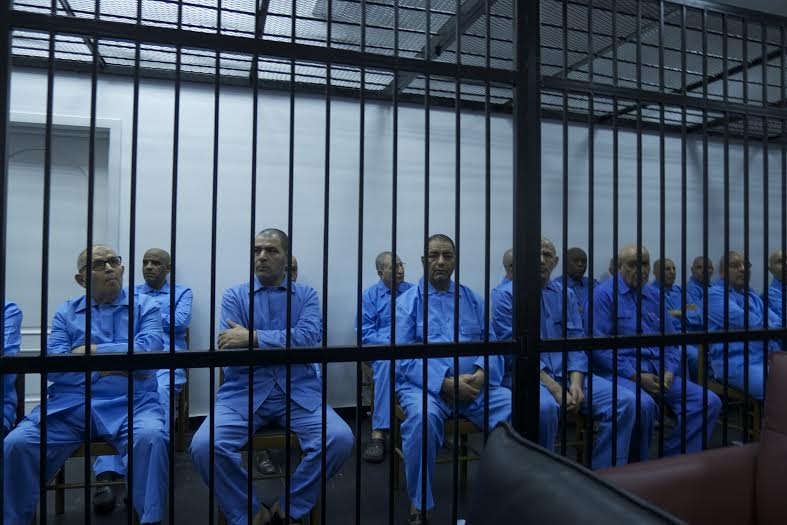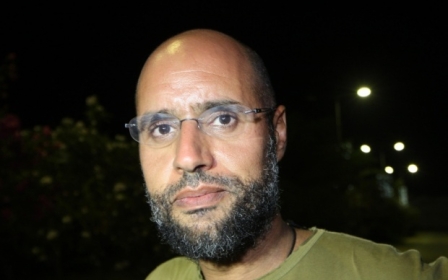Death penalties handed to Gaddafi-era officials in Tripoli

TRIPOLI - The verdicts passed on Saif al-Islam Gaddafi and 36 Gaddafi-era officials in a Tripoli prison courtroom on Tuesday, read through swiftly by the presiding judge, were met initially with silence. As the reality of the sentences - including nine executions by firing squad - sank in, tension mounted.
Sentenced in absentia, Saif was given the death penalty for war crimes committed in the 2011 revolution, as were the old regime’s spy chief Abdullah Senussi and seven other senior officials. The condemned men stared blankly ahead, Senussi with his arms folded, shifting in their seats only when a power cut - now a daily occurrence in Libya - plunged the court into darkness.
In the half-light, the judge read on through the list, naming eight defendants who were sentenced to life imprisonment.
As electricity was restored, a sudden noise at the far end of the cage holding 29 of the defendants prompted the whole courtroom to turn. One of the prisoners, later identified as Radwan al-Hamaly, his face strained and wild, appeared to be having a seizure. As he slid down in his chair, the three sunglass-wearing guards inside the cage rushed forward and scooped him up, carrying out his limp body, sandals falling from his feet.
Judicial and prison officials offered assurances later that he had recovered, citing either asthma or low blood sugar as the reason for Hamaly’s collapse.
Without alluding to the incident, the judge persevered with the list, giving shorter sentences, ranging from five to 12 years in prison. Defendants were also handed fines and ordered to repay money spent during their time in office to the Libyan state - millions of dinars (the excange rate at present is 1 dinar to 0.73 US cents) and even more than that for some individuals.
Four prisoners were acquitted and the case against another, Nouri al-Jatlawi, was dropped, after medical documents confirmed that he was mentally unfit to stand trial.
As the judge left the courtroom, one of the defendants, whose identity could not be ascertained, stood up and shouted: “Criminals! al-Qaeda! Muslim Brotherhood! There is no justice here, nothing.” He was quickly silenced and removed from the courtroom by guards and, as murmurs of discontent started rising amongst the other defendants, prison officials surrounded the cage and ushered the prisoners out of the courtroom through a backdoor.
The head of Hadba Prison, former minister of defence Khaled al-Sherif, who has retained his role at the prison through a series of post-revolution governments in Libya, attended the proceedings. He then presided over the release of the four acquitted men, signing paperwork outside the court and shaking their hands at the gates of Hadba Prison.
Sherif was himself imprisoned for five years under Gaddafi's rule for his role as the deputy leader of the Libyan Islamic Fighting Group (LIFG), a militant organisation which had long sought to overthrow the former ruler. He was incarcerated in 2005 after being transferred from two years spent in alleged US custody in Pakistan and Afghanistan, according to a 2012 Human Rights Watch report. He was later released from Libya’s Abu Salim prison with other LIFG members in 2010.
As the four acquitted Gaddafi-era defendants looked towards freedom, driving down the empty and heavily-secured streets surrounding the Hadba Prison facility, inside, the handful of lawyers who had attended the hearing were already planning their next move.
“This is not the end. We will appeal,” Ali Kabaar, the lawyer defending former Libyan prime minister al-Baghdadi al-Mahmoudi told Middle East Eye. “There are many reasons, and there were thousands of documents in this case, yet the judgement was very quick.” He added that not all defence teams had been able to fulfil their roles, citing problems with court attendance and bringing witnesses to the stand. “This is wrong, and could not happen in any other court in the world,” he said.
Concerns have also been voiced by international organisations, including the UN, which said proceedings had not met international fair trial standards. Defendants were sometimes absent and denied access to lawyers for prolonged periods, and the prosecution presented no witnesses or documents in court, the UN said in a statement.
However the head of investigations for the General Prosecutor’s Office, Sadiq al-Sour, insisted that the trial had been both fair and properly conducted. “Without doubt, it is the correct verdict,” he said.
The death sentence rulings came as a shock to many Libyan citizens, and social media sites reported protests against the court decision in a number of towns. “People in my office were upset when they heard the news,” said businessman Mohamed. He added that dissatisfaction with how life has deteriorated in Libya during the last four years has made some Libyans regret having supported the 2011 revolution.
“I want to say, for all the western countries who attacked our country in 2011, claiming they were looking for human rights in Libya, human rights have disappeared,” said a friend of one of the defendants, speaking on condition of anonymity. “And where are these countries now? They came only to change the regime, they did not come to help the Libyan people. We hear nothing from them now.”
Reflecting how divided Libya has become, others greeted the ruling with jubilation. “I just heard the verdict and I’m really happy because they are getting what they deserve,” said 23-year-old medical student Ayman. “But it’s good that they haven’t all been sentenced to death because this indicates it was a fair trial. I wanted them to be brought to justice but only after a fair trial.”
Appeals against the court’s ruling will be permitted after 16 days. The verdicts will then have to be approved by the High Court, which is also responsible for setting an execution date for the condemned men.
In the case of Saif, the court ruling has little meaningful impact. Saif’s video-link court appearances stopped in May 2014 and his exact whereabouts since that date remains unclear although it is believed that he is still held in the mountain town of Zintan, which is not under the control of the Tripoli-based government.
Under Libyan legislation, no sentence made in absentia - including the death penalty - can be executed until the defendant has stood trial in person, Sour explained. If and when he is transferred to Tripoli, Saif will have to stand trial again, he added.
Middle East Eye propose une couverture et une analyse indépendantes et incomparables du Moyen-Orient, de l’Afrique du Nord et d’autres régions du monde. Pour en savoir plus sur la reprise de ce contenu et les frais qui s’appliquent, veuillez remplir ce formulaire [en anglais]. Pour en savoir plus sur MEE, cliquez ici [en anglais].




